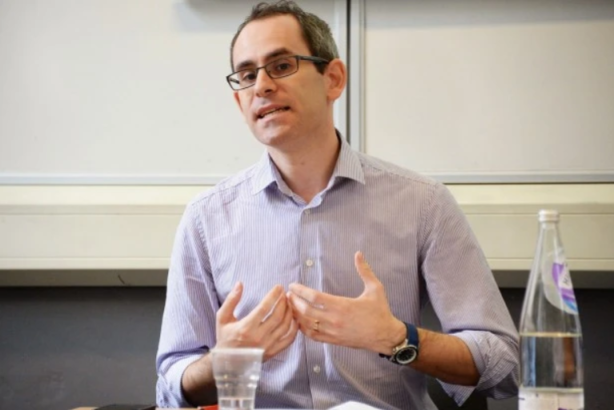Toby Greene is a Lecturer in Politics and International Relations, and former deputy-editor of Fathom. His publications include: ‘The Israelization of British Jewry‘ (with Yossi Shain). We invite responses to this essay.
When Anthony Julius turned to address the question ‘Whither Liberal Zionism’?, in a recent essay published with responses from leading lights of Anglo-Jewry, he and his respondents could scarcely have imagined the ferocity of the current attack on Israeli liberal democracy, nor the extent of civil crisis that would result.
The fast-changing reality demands from liberal Zionists to focus attention on defending the hope of a liberal Israel from what is clearly now its primary threat: the assault on Israel’s democratic institutions perpetrated by Netanyahu’s government.
Julius’s explanation for interrogating his own liberal Zionism, (in a project presumably conceived before the formation of the current government) can be summarised as twofold: on the one hand he calls for self-reflection since ‘self-examination is the Zionist way’. On the other this is an act of self-explanation, to avoid ‘being confused with a type of Zionist that we are not’, and in so doing to make ‘less compelling that hostile caricature ‘Zionism’ … in the public square.’
These are decent motives, and Julius’s engaging essay, along with the rich, varied, and succinct responses with which it is published, offers a valuable contribution on both levels. liberal Zionists in the UK are fortunate to have such an erudite explainer in their camp.
But the changed political reality demands a more pointed agenda. Julius does not omit a call on liberal Zionists to ‘confront [Israel’s] current government, in all its deplorableness.’ Yet in the light of the government’s behaviour this call must surely now take centre stage.
Keenly attuned to the history of antisemitism, Julius acknowledges his past avoidance of public self-examination – i.e. the avoidance of explicitly differentiating his liberal Zionism from other variants – being motivated to avoid the spectacle of public conflict with fellow Jews. Yet the terms of that dilemma have radically shifted since the formation of a far-right Israeli government.
Throughout the last twenty years of struggle against the new anti-Zionism, liberal Zionists have been frequently caught in a bind: squeezed between Israeli governments often pursuing policies to which they were opposed, and anti-Zionists denying the most basic rights of Jews as a people – a position associated with a conspicuous lack of empathy for the Jewish historical experience.
For liberals in Israel, fighting for liberal principles in the context of Israel’s pluralistic democracy created no contradictions with Jewish patriotism. Not so for Diaspora Jews, where publicly challenging Israel’s actions, confronting the government’s supporters or official representatives, or calling on the British government to do so, could be exploited by anti-Zionists; or risk being branded as disloyal; or be mistaken as an attempt to avoid some perceived collective guilt.
Now it is clear that anti-Zionists and the BDS movement, vexing though they have been, are little more than an irritant to the Zionist project, compared to the far greater internal threat posed by Jewish religious messianism and Jewish radicalised nationalism.
Mick Davis does not exaggerate when he writes in his response to Julius that: ‘the make-up and machinations of the current Israeli government present an existential crisis not just to the Zionist ideal … but to Jewish peoplehood itself.’
It is in this light that Julius’s question: ‘Whither Liberal Zionism?’ must now be addressed.
Were liberal Zionists wrong all along?
First, in the mood of intellectual honesty set by Julius, we must, given recent events, be willing to face the most basic question: Were liberal Zionists therefore wrong all along? Were anti-Zionist adversaries right that Zionism is incompatible with liberalism and must in the end converge on racism, colonialism and apartheid?
The answer to these questions is resoundingly ‘no’.
The character of the current Israeli government does not affect the soundness of Julius’s argument that liberalism, far from being incompatible with Zionism, requires it, since historical experience shows that the collective and individual rights of Jews cannot be assured without a Jewish state.
In Julius’s terms, liberal Zionism is a species of Zionism in general, of which the core elements are ‘self-haven’ – the necessity of a Jewish state for Jewish survival; and ‘self-government’ – the necessity of not being dominated by others for the fullest realisation of national life.
A Jewish historical perspective demands a Zionist outlook. As Hadley Freeman puts it in her response to Julius, ‘how could any Jews, with any kind of knowledge of history, not least from the 20th century, be otherwise?’ (And one might add – ‘and with any measure of self-respect.’)
A survey of the present and a glance into the future ought only to reinforce this historical perspective. We are not on the cusp of the liberal dream of the end of history. The vulnerability of Jews in the Diaspora endures. The atmosphere of fear, suspicion, anxiety and conspiracy in which antisemitism inevitably mushrooms, is being fuelled by worldwide trends: an increasingly uncertain global order; war in Europe; radicalised electoral politics and culture wars fuelled by a hyper-fragmented media; and the spectre of environmental catastrophe.
As radical politics resurges in the West, Jews are frequently counted again among the enemies of the far left and the far right. Their security is threatened by Islamist radicalism in the West and in the Middle East. Their freedoms are in some places even threatened by certain strands of liberalism (those for example that would ban circumcision and kosher animal slaughter as ‘illiberal’).
Whatever the trajectory of the political crisis in Israel, therefore, it will remain true that the existence of a Jewish nation state is indispensable to Jewish security and self-confidence.
The need for a Jewish state as ‘self-haven’ is undimmed. But so too is the need for Jewish ‘self-government’. The Jewish cultural and spiritual life for every stream of Jewish affiliation whether in Israel or the Diaspora is immeasurably poorer without the nourishment provided by a flourishing modern Hebrew society. The significance of Israel in the vitality of Jewish culture is rightly emphasised by Daniel Taub, who (in response to Julius) richly describes Israel’s ‘extraordinary alchemy of different migrant Jewish cultures clashing and combining in exciting new ways.’ Israel has enriched Jews everywhere with what Amos Oz described as ‘a cultural golden age’, which would be unthinkable without a Jewish state, and is now endangered by the fanaticism represented by the current Israeli government. This is whilst American Jewry faces soaring assimilation rates among all Jewish streams save for the Orthodox.
Liberal Zionism: both possible and necessary
The fact that a secure and flourishing Jewish life needs Israel does not in itself make a liberal Israel realisable or necessary. Yet experience suggests that it is both.
In Julius’s framing, liberal Zionism means a ‘Zionism of courage’, which stands for justice against unjustified territorial expansion and ‘rabbinic-coercive secular-illiberal elements in Israel.’ I would supplement this with the succinct version of Tal Becker: ‘we get to be as Jewish as a democracy allows, not as democratic as being Jewish allows.’
This synthesis of Jewish self-determination and liberal principles is threaded into the tapestry of Zionist thought from Herzl on down. The short-lived ‘coalition of change’ (2021-22), in which an Arab-Islamic party participated as a full member, revealed new possibilities in bringing about the as yet unrealised social equality of Israel’s non-Jewish minorities.
And whilst that government pointed to the possibilities of liberal Zionism, the current one has underlined its necessity. The catastrophic consequences of its agenda have revealed that liberalism is not just a preference for Israel’s political makeup, it is the prerequisite for Israel’s social cohesion, economic prosperity, and national security.
Could Diaspora Jews detach?
But what if Israel continues down its current illiberal path. What will it mean to liberal Jews in the future? The outcome will not be, as Julius reluctantly contemplates in the final sentences of his paper, that ‘the Jewish state will lose its centrality in the Jewish imagination – that it will so diminish itself, it will merely have the status of one Jewish community among others.’
Israel will never be just another Jewish community. Demographic trends mean it will soon be home to the majority of the world’s Jews. It is the epicentre of Jewish history and the beating heart of modern Jewish culture. It is a place which most British Jews visit regularly and to which they are connected through webs of family and friendship ties, deepened by the sizeable and growing Israeli diaspora in Britain. But more than that, Jewish sovereignty in Israel means that Diaspora Judaism is now forever Israelised. Whilst Israel’s achievements enrich Jewish life everywhere, its challenges similarly envelope Diaspora Jewish life, whether Diaspora Jews like it or not. Israel’s crises will repel (and in some cases perhaps radicalise) Jewish youth; divide Jews internally (where once it bonded them); complicate their relationship with non-Jewish society; and embolden their detractors.
To sum up, there is no escaping two conclusions: the wellbeing of Diaspora Jews depends on there being not only a Jewish state but a liberal Jewish state; and the wellbeing of the Jewish state itself depends on it being liberal and democratic (contingent ultimately on the realization of Palestinian self-determination in a two state solution).
What to do?
All this serves to clarify two tasks with which liberal Zionists have been wrestling in various forms for some time: to fight (paraphrasing Ben-Gurion) illiberal Jewish nationalism as if there is no anti-Zionism and fight anti-Zionism as if there is no illiberal Jewish nationalism.
The State of Israel’s liberal democratic institutions are being assaulted by the government of Israel. How can liberal Zionists in the Diaspora respond? I would highlight several imperatives:
First, they must embrace and support the opposition movement in Israel, representing a majority of the Israeli public. This is a loyal opposition. Its symbol is the Israeli flag. Unimpeachable commitment to the welfare of the state is the hallmark of its legitimacy. It is also a broad-based movement covering a wide political spectrum. It contains elements of the Israeli right whose commitment to liberalism when it comes to Palestinians is deeply inadequate to many liberals. Yet it is unifying and mobilising a new coalition that sees that the combination of radicalised nationalism and religious fundamentalism is the most immediate threat to the State of Israel. The inseparability of these issues from an urgent need to address the Palestinian question may become more widely apparent to those affiliated with these protests over time.
The extent of the confrontation between the Knesset majority and a wide Israeli civil majority, which has grabbed global attention, at least makes it easier to fulfil Julius’s concern to differentiate from other kinds of Zionists. Liberal Zionists are clearly against the far-right Israeli government, and stand with the protest movement in the fight for liberal democracy.
Dilemmas are involved in negotiating this position in the British public space. For British Jews who have decided to take their position to British streets – a group among whom Israelis living in the UK have taken a central role – there is no choice but to contribute publicly and loudly to the wall of opposition. Their mission is to ensure the current Israeli government know that there will be no respite, no rolling over, no burning out, no return to business as usual, so long as they pursue their current agenda. And the leaders of Israel’s liberal democratic institutions, and especially the Supreme Court justices, also know that the support for their independent role defending Israel’s character as a Jewish and democratic state is deep not only in Israel but among Jews across the world.
The central venue for this struggle is of course Israel itself. But it resonated in Israel when Netanyahu was publicly jeered by Israeli-flag-waving British Jews as he walked head bowed into Downing Street in March. It is therefore not without significance that the express commitment of so many Diaspora Jews, who play such a vital role in telling Israel’s story in the UK and elsewhere, is with the protest movement. It is significant also that the consistent message of Jewish Diaspora leaders, when they meet with Israel’s official representatives, is that the government agenda is causing pain, harm and division not only in Israel, but among Jews around the world.
Second, it must be understood that this is a long campaign. A liberal Israel, and a liberal world, is something that will have to be struggled for long into the future. The most important battle in the coming years in Israel will be for free and fair elections. If and when they are held, recent polling suggests that that they could, as a result of recent events, decimate the current coalition and reshape the Israeli political map in as yet unforeseeable ways.
Third, somehow in the midst of this struggle there is a need to contain the fissures among Jews in Israel and in Diaspora communities. Whilst there can be no compromise with corruption, demagoguery and the unjust seizure of power, liberal Zionists must try to understand the legitimate fears and concerns of Jews with different lives, values and priorities to their own, in a spirit of pluralism which is endemic to liberalism. They should also view with sympathy the dilemmas of communal leaders whose responsibility is to represent Jews in all their diversity.
Fourth, it is important to reaffirm the vision of a two-state solution. A liberal and democratic Israel ultimately requires Palestinian statehood. A Liberal Zionism must have its eyes open to injustices suffered by Palestinians living under Israeli occupation, and advocate for urgent policies that will reduce and ultimately end that occupation. It must at the same time reject the tendencies towards a delusional ‘one-statism’, an analytically flawed and politically pointless road to nowhere.
Fifth, liberal Zionists must reject political alliances with illiberals outside of Israel – whether left or right. Some on the radical right, including in Europe and the US, may try to embrace Israel as an emblem of triumphant ethnonationalism, or to detoxify themselves from suspicions of antisemitism, or as a symbol of their Islamophobia. But the political trends with which they are associated are ultimately still threatening to Jews. Liberal Zionists should also avoid lending legitimacy to anti-Zionists, based on a shared opposition to occupation. They have no common cause with those on the radical left and others who reject Jewish self-determination, ignore Jewish historical experience, and falsely reduce Zionism per se to a settler colonial project, or who conspicuously single out Israel for boycotts justified by campaigns of demonization.
Sixth, and related to this, the struggle should be seen in its global context. As David Hirsh puts it in his forward to Julius’s essay: ‘The context of re-founding liberal Zionism is the need to re-address liberalism in general.’ British Jews who faced an electoral choice between Boris Johnson and Jeremy Corbyn have felt this keenly. A liberal Israel thrives in a liberal international order. An illiberal Israel is made possible by a crisis in that order, and the expansion of alternate value systems in which it is not comfortable for Jews to live.































